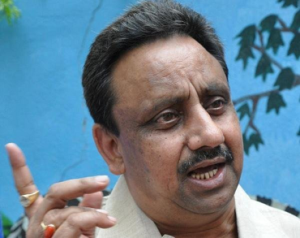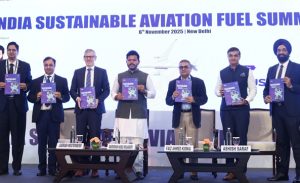- Inaugurates Rajasthan High Court Museum
- “National unity is the foundational stone of India’s judicial system and strengthening it will further strengthen the nation and its systems”
- “It is now our responsibility to make the spirit of Bharatiya Nyaya Sanhita as effective as possible”
- “We have repealed hundreds of colonial laws that had become completely irrelevant”
- “Bharatiya Nyaya Sanhita liberates our democracy from the colonial mindset”
- “Today, India’s dreams are big and the citizen’s aspirations higher”
- “Judiciary has consistently played the moral responsibility of being vigilant and active on national issues”
- “It is very important that simple, accessible and easy justice is guaranteed for everyone in Viksit Bharat”
New Delhi. : The Prime Minister, Shri Narendra Modi addressed the concluding ceremony of the Platinum Jubilee celebrations of the Rajasthan High Court in Jodhpur, Rajasthan today. He also inaugurated the Rajasthan High Court Museum.
The Prime Minister began his address by regretting the inconvenience caused due to the delay in arriving at the venue owing to poor weather conditions during his departure from Maharashtra. He expressed happiness in becoming a part of the Platinum Jubilee celebrations of the Rajasthan High Court and said that the Rajasthan High Court is completing 75 years at a time when the Constitution of India is about to complete its 75 years. Therefore, the Prime Minister said, it is an occasion to celebrate the justice, integrity and dedication of many great personalities. “Today’s event is an example of the nation’s belief towards the Constitution”, the Prime Minister remarked, as he congratulated all flag bearers of justice and the people of Rajasthan on the occasion.
The Prime Minister underlined that the existence of the Rajasthan High Court is related to the history of India’s unity. Recalling the efforts of Sardar Vallabh Bhai Patel to bring together more than 500 states and weave it in a single thread of unity to form India, the Prime Minister pointed out that the various princely states of Rajasthan such as Jaipur, Udaipur and Kota had their own high courts which were integrated to bring the Rajasthan High Court into existence. “National unity is the foundational stone of India’s judicial system and strengthening it will further strengthen the nation and its systems”, Shri Modi remarked.
The Prime Minister remarked that Justice is simple and lucid, however, at times the procedures make it complex. Shri Modi added that it is our collective responsibility to make all efforts to make Justice as simple and lucid as possible. He expressed happiness that India had taken multiple historic and crucial efforts in this direction. He further added that the Government had repealed many irrelevant colonial laws.
Shri Modi noted that India, after decades of independence, emerging out of the colonial mindset had adopted the Bharatiya Nyaya Sanhita replacing the Indian Penal Code. He added that the Bharatiya Nyaya Sanhita was based on the ideals of ‘Justice in place of Punishment’ which is also the basis of Indian thought. Shri Modi expressed confidence that Bharatiya Nyaya Sanhita will advance human thought and free us from the colonial mindset. He added, “It is now our responsibility to make the spirit of Bharatiya Nyaya Sanhita as effective as possible.”
The Prime Minister emphasized that the nation has rapidly transformed in the past decade as he mentioned India’s rise to the 5th largest economy in the world from the 10th position. “Today, India’s dreams are big and the citizen’s aspirations are high”, PM Modi said underlining the need for new innovations and modernization of systems according to the needs of new India. He further added that it is equally important for achieving ‘Justice for All’. The Prime Minister highlighted the important role of technology in revolutionizing India’s judicial system and gave the example of the ‘E-Courts’ project. He informed that more than 18,000 courts in the country have been computerized so far and information pertaining to more than 26 crore court matters has been made available on a centralized online platform through the National Judicial Data Grid. Shri Modi informed that more than 3000 court complexes and more than 1200 prisons have been connected to video conferencing facilities. He also expressed happiness with the pace of work carried out by Rajasthan in this direction where hundreds of courts have been computerized giving way to paperless courts, e-filing, electronic summon service and facilities for virtual hearing. Pointing out the slow-moving processes of courts that existed in the past, the Prime Minister stated that the impactful steps taken by the nation to reduce the burden on common citizens have given new hope to justice in India. The Prime Minister exhorted to maintain this newfound hope by continuously reforming the nation’s judicial system
The Prime Minister remarked that he had continuously mentioned the centuries-old system of our Mediation process on many occasions in the past. He emphasized that the “Alternate Dispute Resolution” mechanism has become an important way for cost-effective and quick decisions in the country today. He added that this system of Alternative Dispute Mechanism will promote Ease of Living as well as Ease of Justice in the country. The Prime Minister underlined that the Government had taken several steps in this direction by amending laws and adding new provisions. Shri Modi expressed hope that with the support of the judiciary, these systems will become more robust.
“Judiciary has consistently carried the moral responsibility of being vigilant and active on national issues”, the Prime Minister remarked. He said that the abrogation of Article 370 from Jammu & Kashmir presents a perfect example of India’s integration. He also mentioned the humanitarian law of CAA and said that the court’s decisions have clarified their stand on natural justice. Prime Minister Shri Modi underlined that the Supreme Court and the High Courts have strengthened the resolve of ‘nation first’. Referring to the Secular Civil Code as mentioned by the Prime Minister during his address from the Red Fort, he said even though the present government has raised the matter now, India’s judiciary has always advocated in its favour. He said that the Court’s stand on matters of national unity instil confidence in the citizens.
The Prime Minister emphasized that the word ‘integration’ is going to play a major role in 21st-century India. “Integration of modes of transport, data, health system – Our vision is that all the IT systems of the country which are working separately should be integrated. Police, forensics, process service mechanisms. The Supreme Court of India to district courts, all should work together”, the Prime Minister exclaimed. He also conveyed his best wishes for the integration project that has been initiated in all the district courts of Rajasthan today.
The Prime Minister remarked that the use of technology is becoming a tried and tested formula for the empowerment of the poor in today’s India. He added that India has received praise from many global agencies and organizations in the last 10 years. Shri Modi emphasized how India works in many areas, from DBT to UPI, and has emerged as a global model. He further added that the same experience should be implemented in the justice system as well. Shri Modi noted that in this direction, technology and access to legal documents in one’s own language will become the most effective means of empowering the poor. He added that the government is also promoting an innovative solution called Disha, and invited law students and other legal experts to help in this campaign. The Prime Minister also emphasized that there is work to be done in making legal documents and judgments available to people in local languages. He further added that the Supreme Court of India had already started this with the help of a software where judicial documents can be translated into 18 languages. Shri Modi appreciated all the unique efforts undertaken by the judiciary.
The Prime Minister expressed confidence that the courts will continue to give top priority to Ease of Justice. “It is very important that simple, accessible and easy justice is guaranteed for everyone in Viksit Bharat”, Shri Modi concluded
Governor of Rajasthan, Shri Haribhau Bagade, Chief Minister of Rajasthan, Shri Bhajan Lal Sharma, Union Minister for Law & Justice (Independent Charge), Shri Arjun Ram Meghwal, Justice of Supreme Court of India, Justice Sanjeev Khanna, and Chief Justice of Rajasthan High Court, Justice Manindra Mohan Shrivastava were present on the occasion.


